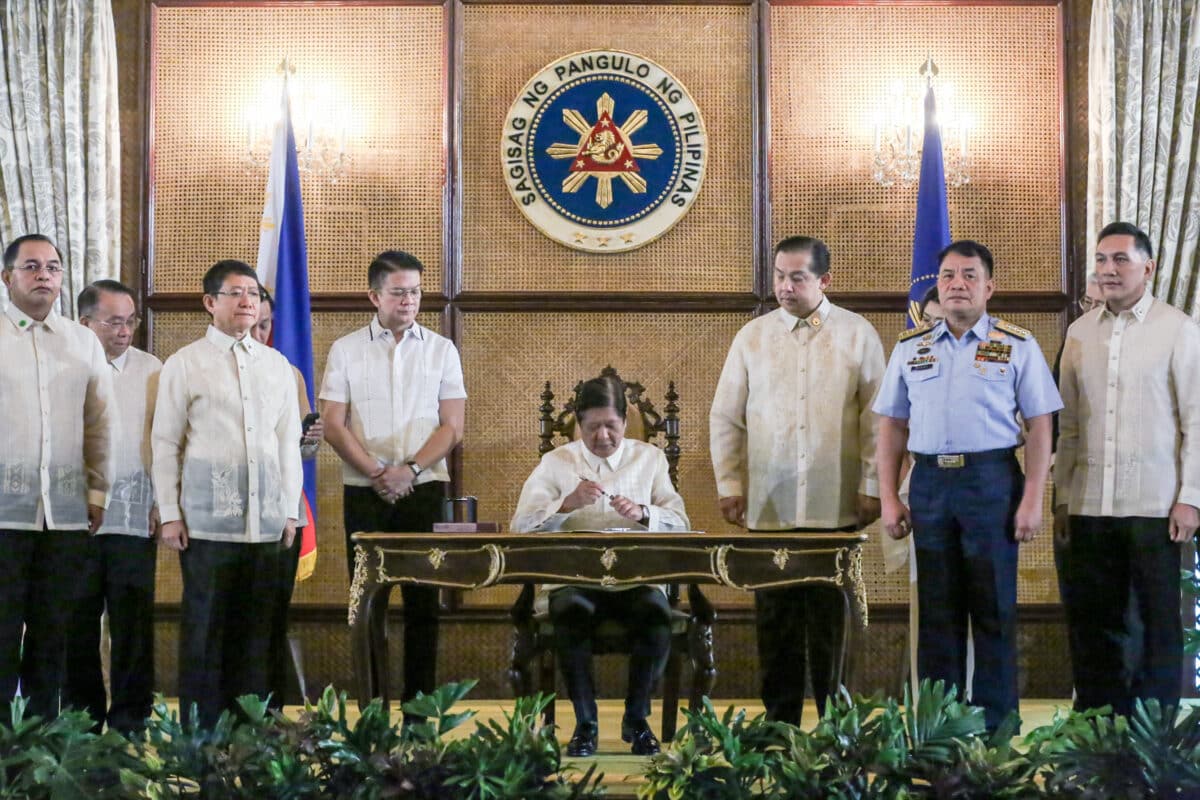PH unfazed as China protests new maritime laws

LANDMARK LAWS President Ferdinand Marcos Jr. signs into law the Philippine Maritime Zones Act and the Philippine Archipelagic Sea Lanes Act in Malacañang in this file photo taken on November 8, 2024. Present here are Senate President Francis Escudero, Speaker Martin Romualdez, Armed Forces Chief of Staff Gen. Romeo Brawner Jr., National Security Adviser Eduardo Año, Senator Francis Tolentino and Philippine Coast Guard Commandant Adm. Ronnie Gavan. —PPA POOL PHOTO
TAGAYTAY CITY – President Ferdinand Marcos Jr. said Thursday that the Philippines remains firm in its position on the West Philippine Sea (WPS) even after China objected to the passage of the new maritime and archipelagic sea lane laws.
Last November 9, Chinese Foreign Ministry Spokesperson Mao Ning condemned the signing into law of the Philippine Maritime Zones Act and the Philippine Archipelagic Sea Lanes Act.
In a media interview, Marcos said nothing changed in the government’s policies even after China summoned the Philippine ambassador to protest the signing of the new laws.
“Ang sabi nila (They are saying) that we do not agree and you will – that they will continue to protect what they defined as their sovereign territory. Of course, we do not agree with their definition of sovereign territory,” he told reporters.
READ: China opposes PH maritime zones law, says it violates territorial sovereignty
The President last week signed the Maritime Zones Act and the Archipelagic Sea Lanes Act into law to strengthen the country’s maritime claims and bolster its territorial integrity.
The Philippine Maritime Zones Act or Republic Act (RA) 12064, aims to declare the rights and entitlements of the Philippines over its maritime zones to establish legal bases for the conduct of social, economic, commercial, and other activities in the areas.
RA 12064 provides for a general declaration of the maritime zones under the jurisdiction of the Philippines, including internal waters, archipelagic waters, territorial sea, contiguous zone, exclusive economic zone (EEZ), and continental shelf.
Meanwhile, the Archipelagic Sea Lanes Act, or RA 12065, designates the sea lanes and air routes suitable for the continuous and expeditious passage of foreign ships and aircraft through or over its archipelagic water and the adjacent territorial sea.
RA 12065 prevents arbitrary international passage in the Philippine archipelago and prescribes the rights and obligations of foreign ships and aircraft exercising the right of archipelagic sea lanes passage through the established Philippine archipelagic sea lanes.
Tensions between China and the Philippines over the West Philippine Sea have escalated throughout the year, particularly over the Scarborough Shoal, where incidents of Chinese harassment have been reported.
Marching orders
In an ambush interview on Thursday, reporters asked Marcos if he had given marching orders to the Philippine Ambassador to China regarding its condemnation, to which he responded there were none.
“They are objecting to the new law, saying that ‘we do not agree,’ and they will continue to protect what they define as their sovereign territory,” Marcos said in a mix of Filipino and English
“Of course, we do not agree with their definition of sovereign territory. So, nothing has changed because our situation remains the same, and our position remains the same,” he continued.
In response to China’s actions, the Department of Foreign Affairs also summoned Chinese Ambassador Huang Xilian to deliver the Philippines’ protest over China’s drawing of baselines around Bajo de Masinloc on November 10.
For comprehensive coverage, in-depth analysis, visit our special page for West Philippine Sea updates. Stay informed with articles, videos, and expert opinions.


















